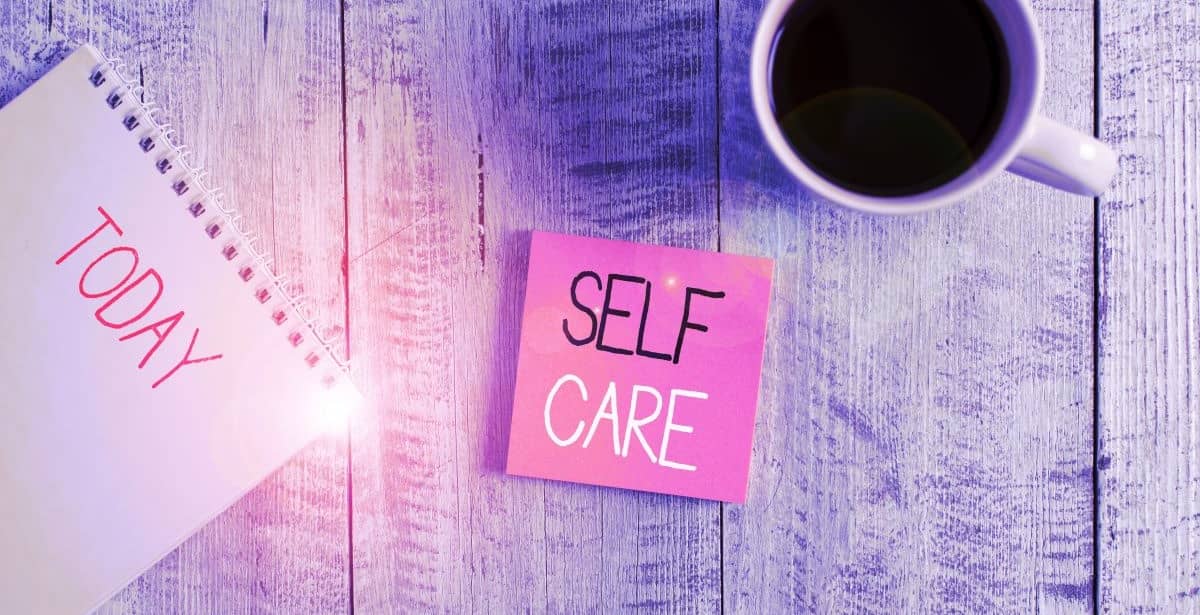Self-Care for Nurses: 5 Habits That Help

As a nurse, you regularly set aside your own comfort on behalf of others. The past year has called for exponentially greater sacrifice and you have more than risen to the occasion. As the COVID-19 pandemic raged, you elevated the needs of your patients above your own safety, time and again. You’re the very definition of an essential worker.
Part of what makes you essential to our communities isn’t just your understanding of science and medicine—it’s the way you care for the whole person. However, as you passionately focus on the needs of other people, it’s easy to forget that holistic self-care for nurses is essential, too.
Ignoring self-care for nurses may eventually lead to burnout and even compassion fatigue, a condition resulting from chronic exposure to traumatic situations. Since nurses are continually attending to individuals and families in highly stressful circumstances, they are especially vulnerable to these conditions.
On the other hand, intentional self-care for nurses can keep you energized and well mentally, physically, and spiritually. In your busy day-to-day life, it is vital to commit to valuable self-care practices so they don’t fall by the wayside. To help you prioritize caring for your health, we’ve identified five approachable, accessible, and achievable habits.
Request Your Free Program Guide
Self-Care for Nurses Habit #1: Set Limits and Simplify
Self-care for nurses starts with knowing your boundaries and wisely choosing your time commitments. This applies both to your workplace and your personal life.
A recent review paper found that “maintaining healthy boundaries between the professional and personal life of helpers” is a foundational self-care practice. By learning to say no and communicating needs, nurses can experience the benefits of healthy boundaries.
At work, you are continually juggling the expectations of patients, families, leaders, and coworkers. As a nurse, caring about others comes naturally, so you may tend to take on more burdens than you should.
Here are a few tips for simplifying your workload:
- Talk with your supervisor or call an informal meeting with coworkers to assess tasks and reallocate responsibilities, as needed.
- Evaluate your processes and record-keeping systems, then implement technology to help manage workflow and assignments.
- Politely wrap up conversations with overly demanding patients before they absorb an undue amount of your time.
Beyond your job as a nurse, you likely have plenty of other responsibilities that weigh heavily on you, too. Following the same general principles you’re using to simplify in the workplace, try this at home:
- Use a daily planner or electronic task list to map out weekly plans and break up to-do lists in daily chunks.
- Delegate tasks to other family members or housemates when it makes sense, and identify other time-consuming activities you may need to drop.
- Before taking on a new responsibility, take the time to evaluate how it will affect the top priorities in your life.
- Pull back from relationships or communication cycles that drain your time and energy.

Self-Care for Nurses Habit #2: Nourish Your Physical Health
As a nurse, you are continually tending to the physical needs of others. If you’re not caring for your own body, you won’t have the energy and strength you need to do your job well. Self-care for nurses means nourishing yourself.
Eat with Wellness in Mind
When was the last time you assessed your intake of the major food groups? With MyPlate resources, the USDA makes it easier than ever before to know what to eat and how to build a variety of fruits, vegetables, grains, dairy, and protein into your food plans.
Filling your diet with colorful foods high in antioxidants is a great way to protect yourself against disease. Adding salads and other vegetables to your meals is important, but you can also sneak in extra nutrients by snacking on fruits, nuts, and whole grains instead of chips and candy bars.
And don’t forget to stay hydrated. In addition to keeping your body energized and functioning properly, water helps you achieve optimal cognitive function as well. If you’re struggling with maintaining attention or organizing your work and life processes, this creates stress and inhibits your other self-care efforts. Splurge on a quality water bottle you love and keep it filled and on hand throughout the day.
Add Movement
We know that exercise is critical in self-care for nurses, just as it is for anyone. Yet we often sacrifice the time for exercise because of more urgent activities in our daily schedules. Letting important commitments to physical self-care take priority over pressing items on your to-do list, though, may be an investment in your health both in the short-term and long-term.
The CDC recommends 75–150 minutes of exercise weekly, which can sound like an overwhelmingly high amount. But those minutes can be divided up into smaller segments throughout the week and even throughout the day. Moderate-intensity movement—like an energizing outdoor walk—can happen during a 15-minute shift and not only help you achieve your exercise goals but boost your energy.
Restore Your Body with Good Sleep
Sleep plays a tremendous role in rejuvenating the body. From reinforcing the immune system to regulating hormone production, regular rest is an essential part of caring for your body. Johns Hopkins sleep expert and neurologist Mark Wu, M.D., Ph.D., explains that during healthy sleep, “the brain is engaged in a number of activities necessary to life—which are closely linked to quality of life.”
Low-quality or insufficient sleep also stimulates the production of cortisol, elevating stress levels. And sleeping six hours or less increases your chances of serious health problems, including heart attack, stroke, and diabetes.
Assuring good sleep takes some intentionality, though, especially when you’re carrying numerous demands and stresses. These are some tips for improving your quality of sleep:
- Skip the “snooze” when your alarm goes off
- Limit caffeine to morning hours
- Minimize liquids and avoid alcohol near bedtime
- Adjust your thermostat for a cooler room
- Dim lights in the evening
- Consider new bedding, including your pillow
- Opt for a book over electronic screens in the evening

Self-Care for Nurses Habit #3: Nurture Your Spirit
When you feel stressed out and overwhelmed, it can feel counterintuitive to think about adding a new hobby to your life. But consider it this way: you naturally have interests, desires, and personal passions. You likely found activities in childhood that could hold your attention for hours. So what if, rather than thinking of an activity or hobby as adding something new to your life, you thought in terms of giving yourself permission to welcome back a part of yourself that you’ve been pushing aside?
Returning to childhood interests can boost happiness and relieve stress. And a comprehensive study published by the National Institutes of Health links pleasurable activities to positive physical and psychological outcomes.
Practicing relaxation techniques, mindfulness, or spiritual practices can counter anxiety and help you deal proactively with stressors. It may be helpful to block off time each day for quiet reading and reflection. Beyond this, there may be times at work when you need to step away for a few minutes and take some deep breaths or strike a yoga pose.
Outside of work, maybe it’s time to try a new hobby or explore a latent passion. Fuel your creativity by taking a class or joining a club. If you’re an extrovert, being part of a group may energize you even more.
And maybe it’s time to play again—game night, anyone? Turning your attention from work and other responsibilities will lift your mood. Laughter increases your oxygen intake and endorphins. In fact, it can even strengthen your immune system and help your body produce natural painkillers. However you go about it, welcome refreshment into your life.
Self-Care for Nurses Habit #4: Make Room for Relationships
Building healthy relationships requires time and commitment, but it’s worth it.
Distinguished psychologist and best-selling author Henry Cloud describes the “power of the other” in the value of relationships. Relational connections empower us to move toward our dreams, he says. The process of growing our hearts, minds, and souls “needs other people.”
Identify the most important relationships in your life and prioritize those with intentional focus. Here are some commitments to keep a relationship on the right track:
- Consider the other’s point of view
- Demonstrate trustworthiness
- Share feelings openly with respect
- Give and take in supporting each other
- Some relationships drain us, and others energize us. Self-care for nurses may mean proactively focusing on positive relationships.
When you’ve identified the healthy, reciprocal relationships in your life, you’ll find that investing time with those people helps you to grow and live your best life. Prioritize time for your most important relationships by setting boundaries in your schedule and intentionally planning to spend time with the people who matter most to you.
As a bonus, choose activities that help you maintain your other self-care habits, too. Schedule a walk or bike ride together. Join the same book club or craft group. Go out for a smoothie instead of ice cream.

Self-Care for Nurses Habit #5: Reach for Your Goals
Think back to when you first decided to become a nurse. What led you to that choice? How did you imagine your life unfolding once you started to practice? What are the later-in-your-professional-career goals you imagined yourself achieving?
Pursuing achievement is a vital part of self-care for nurses. In nursing, graduate education is an important step toward that pursuit. In fact, a report published by the Robert Wood Johnson Foundation shows that nurses with advanced education are more likely to be “extremely satisfied” in their work than those with less education.
Are You Just Starting Your Nursing Journey?
The entry-level option for students with non-nursing undergraduate degrees is the Online ABSN. In just 16 months, Online ABSN students complete the following requirements in preparation for RN careers:
- An on-campus residency
- Clinical placements in Virginia
- 100% online courses on topics like Research and Evidence-Based Practice
Marymount’s ABSN is accredited by the Commission on Collegiate Nursing Education (CCNE). Nursing courses at Marymount are taught by practicing APRNs who can speak with authority about the profession. The university’s stellar reputation is confirmed by top U.S. News & World Report rankings in its National Universities and Nursing categories.
If you want to become an RN, contact one of our student advisors to discuss if this program is right for you.
